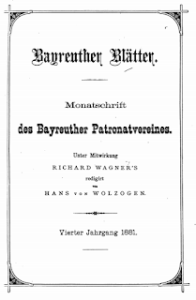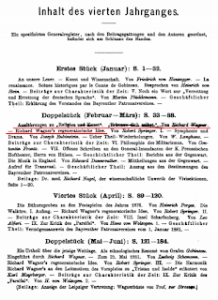 THAT “Jew is the demon” quote by Richard Wagner…
THAT “Jew is the demon” quote by Richard Wagner…
Recently I have seen an alleged quote by the great composer, Richard Wager doing the rounds on the internet.
The quote in question that you most often see is, “The Jew is the demon behind the corruption of mankind.” However, once again it is never accompanied by a source.
Obviously my OCD and sheer compulsion for facts kicked in and drew me into needing to source this alleged quote. I give a list at the end of this article on my other quotation source corrections.
Outside of the original source, as far as I can tell the first major use of the quote was in the National Socialist documentary, Der Erwige Jude (The Eternal Jew) that was released on November 28th 1940, spoken in German by the narrator, Harry Giese. It was directed by Fritz Hippler and written by Eberhard Taubert. You can hear it spoken at 2:38 minutes in. Here is the screenshot with English subtitles:

You can also view the original German language edition with no subtitles or an English narrated version. Clearly, most people that use it today get the quote from this English subtitled version of Der Erwige Jude. That is, even if they know this source at all, and not just spread around the unsourced image quote from the top of this page.
The original German of this quote as spoken in the documentary is, “Der Jude ist der plastische Dämon des Verfalles der Menschheit.” Which in English is translated as “The Jew is the plastic Demon of the Decline/Decay of Mankind/Humanity” or “The Jew is the plastic demon of Human Decay.”
On March 26th 1941 the Institut zur Erforschung der Judenfrage (Institute for Research on the Jewish Question) opened. This was an institution of the NSDAP. Several of the lectures given at the 3-day opening were published in the magazine, “Der Weltkampf” (The World Struggle). Two of the lectures published in this magazine from the lectures at the 3-day opening event were by Alfred Rosenberg. One was ‘Nationalsozialismus und Wissenschaft’ (National Socialism and Science) and the other was ‘Die Judenfrage als Weltproblem’ (The Jewish Question as a World Problem) by Alfred Rosenberg.
It was the latter speech I believe that, ‘Und Alfred Rosenberg sagte in seiner Rede: „Das Wort Richard Wagners: ,Der Jude ist der plastische Dämon des Verfalles der Menschheit’, zeigt über alles Zufällige hinaus die Symbolik der geschichtlichen Lage.“’ (‘And Alfred Rosenberg said in his Speech: ‘The Word of Richard Wagner: ‘The Jew is the plastic Demon of the Decline of Mankind’, shows the symbolism of the historical situation beyond anything accidental.”)
This is quoted in Léon Poliakov and Josef Wulf’s book, ‘Das Dritte Reich und seine Denker’ (The Third Reich and its Thinkers), München, New York, London, Paris. 1978, p. 142. The source Poliakov and Wulf give is, “Das Archiv”, März 1941, S. 1150–1153; vgl. Dokument CXLIII – 305/30.
I have since found out that Rosenberg was actually paraphrasing Wagner for his speech, taking out the essential part, in context, of what Wagner originally said.
Wagner wrote this in a piece in 1881 called “Erkenne dich selbst” (Know Thyself) from ‘Ausführungen zu “Religion und Kunst.”’ which originally appeared in the Bayreuther Blätter for February-March, 1881. It can be viewed in direct PDF format here from the web-archive page here. The specific essay starts on page 33 on the actual PDF and the quote is on page 39. I have taken screenshots below, followed by the transcription by myself. I have underscored in red the article on the contents page.HCZ




The full quote, in its original German, from the source, as pictured above, is as follows:
“So braucht der Jude weder zu denken noch auch zu faseln, selbst nicht zu rechnen, denn die schwierigste Rechnung liegt in seinem, jeder Idealität verschlossenen, Instinkte fehlerlos sicher im Voraus fertig vor. Eine wunderbare, unvergleichliche Erscheinung; der plastische Dämon des Verfalles der Menschheit in triumphirender Sicherheit, und dazu deutscher Staatsbürger mosaischer Konfession, der Liebling liberaler Prinzen und Garant unserer Reichseinheit.”
You can translate this yourself, but I would not trust the English translation of William Ashton Ellis from 1897 as this has been shown to be absolutely appalling.
So yes, the quotation from Der Erwige Jude from 1940 and Alfred Rosenberg’s speech from 1941 are both correct; they were, as I have stated earlier, both actually paraphrasing Wagner, taking out the essential part, in context, of what Wagner originally said.
As a side, I also recommend Wagners’ Judaism in Music essay from 1850.
(Source)